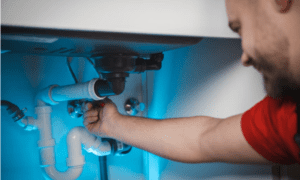Are you interested in pursuing a career as a commercial plumber? If so, you’re embarking on a path that can be both challenging and rewarding. Commercial plumbers play a vital role in ensuring the smooth operation of businesses, institutions, and public facilities by installing, repairing, and maintaining plumbing systems. In this comprehensive guide, we’ll walk you through the essential steps to become a successful commercial plumber, from acquiring the necessary skills and education to building a thriving plumbing business.
Understanding the Role of a Commercial Plumber
Before diving into the specifics, it’s crucial to understand the responsibilities and scope of work involved in commercial plumbing. Commercial plumbers handle large-scale projects, such as installing plumbing systems in office buildings, hospitals, schools, and industrial facilities. Their tasks may include working with complex piping systems, troubleshooting plumbing issues, and ensuring compliance with building codes and regulations. A successful commercial plumber needs to possess a diverse set of skills and knowledge.
Acquiring the Necessary Skills and Education
Becoming a commercial plumber requires a combination of formal education, vocational training, and hands-on experience. Here are the key steps to get started:
3.1 Vocational Training and Apprenticeships
Many aspiring plumbers begin their journey by enrolling in vocational training programs or joining apprenticeship programs. These provide a solid foundation in plumbing principles, pipefitting, blueprint reading, safety protocols, and trade-specific tools. Apprenticeships offer the advantage of learning on the job while earning a wage under the guidance of experienced professionals.
3.2 Obtaining a Plumbing License
To work as a commercial plumber, you’ll typically need to obtain a plumbing license. The requirements vary by location, but they often include a combination of completing a certain number of apprenticeship hours, passing an exam, and demonstrating the necessary skills and knowledge. Check with your local licensing board for specific regulations in your area.
3.3 Continuing Education and Certifications
Plumbing is an ever-evolving industry, and staying updated with the latest techniques, codes, and regulations is crucial for success. Pursuing continuing education courses and certifications can enhance your skills and demonstrate your commitment to professional growth. Look for programs offered by trade associations, community colleges, and industry organizations.
Gaining Hands-On Experience
While education and training lay the foundation, gaining hands-on experience is vital for becoming a proficient commercial plumber. Consider the following steps:
4.1 Working as an Apprentice
As an apprentice, you’ll work alongside experienced plumbers, learning the trade through practical applications. This hands-on experience allows you to develop your skills, understand real-world plumbing challenges, and build a network of industry professionals.
4.2 Joining a Plumbing Company
After completing your apprenticeship or vocational training, joining a reputable plumbing company can provide valuable opportunities for growth. Working under experienced mentors, you’ll gain exposure to a wide range of projects, expand your knowledge, and refine your skills.
4.3 Building a Portfolio of Projects
To showcase your abilities and attract clients, it’s essential to build a portfolio of completed projects. Take photographs, collect references, and document your involvement in different plumbing assignments. This portfolio will serve as tangible proof of your expertise and professionalism.
Developing Essential Skills for Commercial Plumbing
Beyond technical knowledge, successful commercial plumbers must possess a range of essential skills. Let’s explore them:
5.1 Technical Skills
Technical proficiency is the foundation of a successful commercial plumber. You need a deep understanding of plumbing systems, pipe materials, fittings, and tools. Additionally, knowledge of blueprints, codes, and regulations is crucial for proper installation and compliance.
5.2 Problem-Solving and Critical Thinking
Commercial plumbing projects often present unique challenges that require problem-solving skills. From diagnosing complex issues to finding innovative solutions, the ability to think critically and adapt is vital in the plumbing industry.
5.3 Communication and Customer Service
Strong communication skills are essential for effective collaboration with clients, contractors, and other professionals involved in the project. Clear and concise communication helps ensure everyone’s expectations are met, reducing the likelihood of misunderstandings or errors.
Building a Professional Network
Networking is a valuable asset for any professional, and commercial plumbers are no exception. Here’s how to build a robust professional network:
6.1 Joining Plumbing Associations and Organizations
Plumbing associations and organizations offer numerous benefits, such as networking opportunities, educational resources, and industry updates. Consider joining local and national associations like the Plumbing-Heating-Cooling Contractors Association (PHCC) or the American Society of Plumbing Engineers (ASPE).
6.2 Attending Trade Shows and Conferences
Trade shows and conferences provide a platform for networking with industry peers, discovering new technologies, and staying updated with the latest trends. Take advantage of these events to connect with manufacturers, suppliers, and potential clients.
6.3 Collaborating with Other Professionals
Building relationships with professionals in related fields, such as general contractors, architects, and electricians, can lead to referrals and collaborative opportunities. Establishing a reputation for reliability and teamwork can open doors to larger commercial projects.
Marketing and Promoting Your Plumbing Business
To succeed as a commercial plumber, it’s crucial to market and promote your services effectively. Consider the following strategies:
7.1 Creating an Effective Website
A professional website serves as your online presence and showcases your services, expertise, and contact information. Optimize your website for search engines, ensure it is mobile-friendly, and include testimonials from satisfied clients.
7.2 Utilizing Local SEO Strategies
Local search engine optimization (SEO) helps your business appear in search results when potential clients in your area search for commercial plumbing services. Claim your Google My Business listing, optimize your website with local keywords, and encourage clients to leave reviews.
7.3 Engaging in Online and Offline Marketing
Expand your reach through various marketing channels. Consider online strategies such as social media marketing, pay-per-click advertising, and content marketing. Offline tactics like distributing business cards, participating in community events, and leveraging local directories can also be effective.
Providing Excellent Service and Building a Reputation
Delivering exceptional service and building a strong reputation are crucial for long-term success in the plumbing industry. Focus on the following:
8.1 Delivering High-Quality Workmanship
Consistently providing high-quality work is essential for client satisfaction and positive word-of-mouth referrals. Pay attention to detail, follow industry best practices, and stay updated with the latest plumbing technologies and techniques.
8.2 Ensuring Customer Satisfaction
Customer satisfaction should be a top priority. Communicate clearly, listen to your clients’ needs, and address any concerns promptly. Going the extra mile to exceed expectations can lead to repeat business and referrals.
8.3 Obtaining Positive Reviews and Testimonials
Encourage your satisfied clients to leave reviews and testimonials on your website, social media platforms, or industry-specific directories. Positive feedback builds trust and credibility, making it easier to attract new clients.
Expanding Your Skill Set and Services
To stay competitive and meet the evolving needs of clients, consider expanding your skill set and offering specialized services:
9.1 Staying Updated with Industry Trends
Plumbing technologies and practices evolve over time. Stay updated with industry trends by reading trade publications, attending workshops, and participating in online forums. Embrace new techniques and tools that can enhance your service offerings.
9.2 Learning New Plumbing Technologies
As commercial plumbing advances, so do the technologies used in the field. Stay informed about energy-efficient systems, smart plumbing solutions, and sustainable practices. Expanding your expertise in these areas can differentiate your business and attract environmentally conscious clients.
9.3 Offering Specialized Services
Consider specializing in specific areas of commercial plumbing, such as medical gas installation, green plumbing, or fire suppression systems. Developing expertise in niche markets can set you apart from competitors and attract clients seeking specialized services.
Managing Your Plumbing Business
Successfully managing your plumbing business is crucial for long-term growth and profitability. Focus on the following aspects:
10.1 Financial Management
Maintain accurate financial records, track expenses, and ensure your pricing structure covers costs while remaining competitive. Consider investing in accounting software and consult with professionals to maximize tax benefits.
10.2 Time and Project Management
Efficient time and project management are vital for completing projects on schedule and within budget. Utilize project management tools, create realistic timelines, and communicate effectively with clients and team members to avoid delays or misunderstandings.
10.3 Hiring and Training Employees
As your business expands, hiring and training skilled employees become essential. Establish clear job descriptions, invest in training programs, and foster a positive work environment to attract and retain talented plumbers.
Overcoming Challenges and Continuing Growth
The plumbing industry presents its share of challenges. Here’s how to overcome them and continue growing:
11.1 Handling Difficult Clients or Projects
Difficult clients or challenging projects can be part of the job. Maintain professionalism, practice effective communication, and address issues proactively. Learn from these experiences to improve future client interactions.
11.2 Adapting to Industry Changes
The plumbing industry constantly evolves, driven by new regulations, technologies, and market trends. Stay adaptable and open to change. Embrace new methods, invest in training, and anticipate industry shifts to remain competitive.
11.3 Pursuing Personal and Professional Development
Continued personal and professional development is key to long-term success. Attend workshops and conferences, pursue advanced certifications, and seek mentorship from industry leaders. Commit to lifelong learning and self-improvement.
Conclusion
Becoming a successful commercial plumber requires a combination of technical skills, industry knowledge, and business acumen. By acquiring the necessary education, gaining hands-on experience, developing essential skills, and effectively marketing your services, you can build a thriving plumbing business. Stay adaptable, deliver exceptional service, and continue expanding your expertise to navigate challenges and achieve long-term growth in this rewarding profession.



































